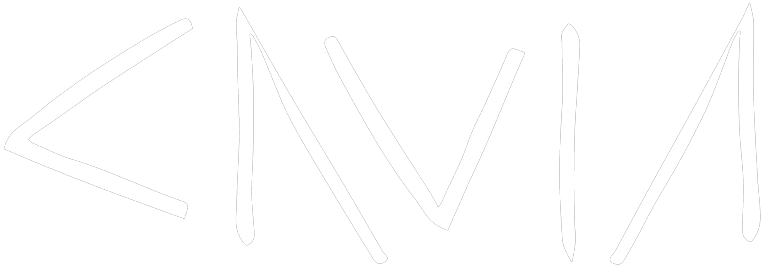September
| Vr. 08 | | Asian Animation Short Festival – Monologue of Dreams |
| Za. 09 | | Asian Animation Short Festival – Monologue of Dreams |
| Vr. 15 | | aemi on tour: Súitú |
| Za. 16 | | Cinema Colombiano – Visiones de la Tierra |
| Vr. 22 | | Tabutta Rövaşata |
| Za. 23 | | Oldboy + nagesprek |
| Vr. 29 | | Kissable Screens: Las hijas del fuego (The Daughters of Fire) |
| Za. 30 | | Recuperando el paraíso |
Vrijdag 8 september, 19:00
Zaterdag 9 september, 19:00
SPECIAL
Asian Animation Short Festival – Monologue of Dreams
Asian Movie Night x KloosterKino
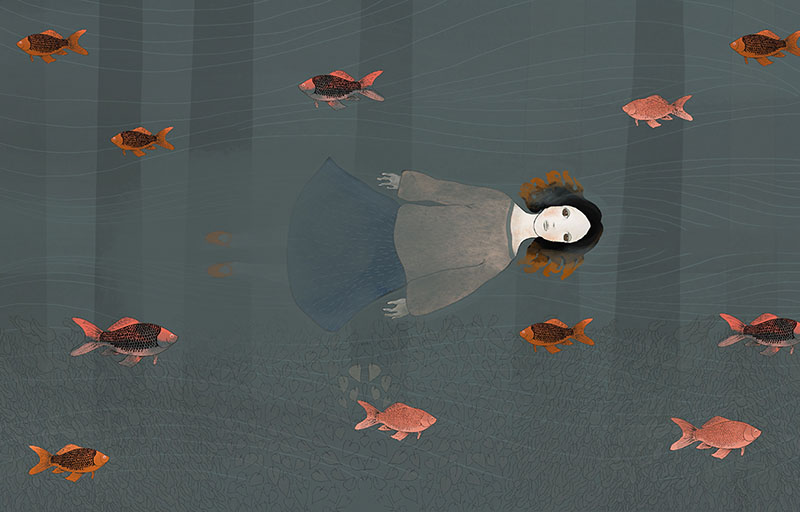
NL Terwijl de herfst onze ogen kleurt met gele tinten en bladeren ons omhullen in een knusse deken, brengt Asian Movie Night deze september samen met KloosterKino het speciale korte filmprogramma 'Monologue of Dreams' naar Cavia. Dit programma onderzoekt de complexe en universele thema's die door de lens van Aziatische verhalenvertellers worden geportretteerd, met 8 verschillende werken uit Zuid-Korea, China, Japan, Iran en Armenië. Meer→
EN As autumn paints our eyes with shades of yellow and leaves wrap us in a cozy blanket, this September, Asian Movie Night is teaming up with KloosterKino to bring you the special shorts programme 'Monologue of Dreams'. This programme explores the complex and universal themes portrayed by the lens of Asian storytellers, featuring 8 diverse works from South Korean, China, Japan, Iran and Armenia. More→
Vrijdag 15 september, 20:30
EXPERIMENTAL
aemi on tour: Súitú
+ Q&A met filmmakers
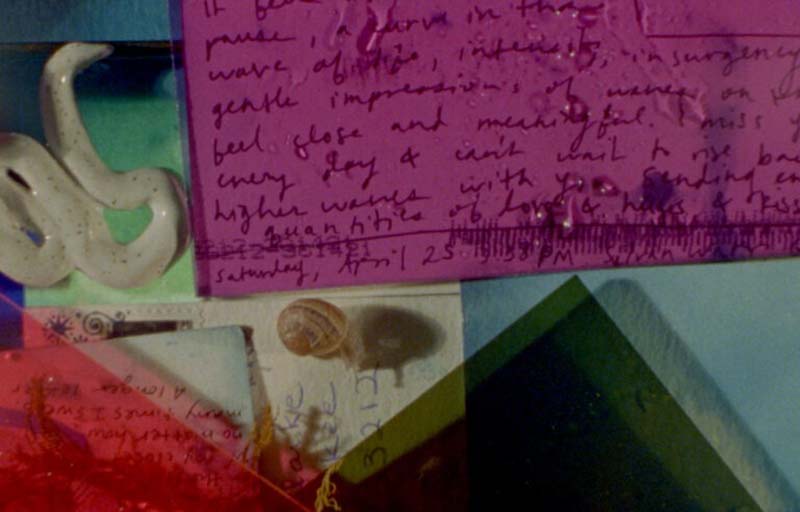
NL Súitú is het nieuwe rondreizende filmprogramma samengesteld door het collectief aemi en we zijn verheugd om het in Cavia te vertonen.
aemi is een in Dublin gevestigd initiatief dat bewegend beeldwerk van kunstenaars en experimentele filmmakers ondersteunt en regelmatig tentoonstelt.
EN Súitú is the new touring film programme curated by aemi and we're very excited to show it in our cinema. ‘Súitú’ – an Irish language term pronounced Suet-two – evokes the sucking in-and-out sound made as the sea moves through stones at the shoreline, a sound often heard in springtime as large waves pull pebbles and stones before rolling them back in. Evoking the elemental, the programme’s pacing picks up not just on the familiar ebbs and flow of the sea, but also the rhythmic actions that circumscribe contemporary lived experience. From inner psychological journeys to the phenomenological, the seven films in this programme together offer an emotional, embodied and deeply sensory experience.
aemi is a Dublin-based initiative that supports and regularly exhibits moving image works by artists and experimental filmmakers.
Contorno/ Contour Fábio Andrade, 2021, Brazilië, 10 mins
Eyes Like Cats Susan Hughes, 2022, Noord-Ierland, 3 mins
A Human Certainty Morgan Quaintance, 2021, UK, 20 mins
Yon Bárbara Lago, 2021, Argentinië, 8 mins
Other Tidal Effects Sofia Theodore-Pierce, 2021, USA, 7 mins
Hook, Spill, Cry Your Eyes Out Lisa Freeman, 2020, Ierland, 3 mins
Cabbage Holly Márie Parnell, 2023, Ierland, 28 mins
Zaterdag 16 september, 14:00
FESTIVAL
Cinema Colombiano – Visiones de la Tierra

NL Ook dit jaar vindt het filmfestival Cinema Colombiano weer plaats in Filmhuis Cavia en in WORM te Rotterdam. Zij nodigen je dit jaar uit om te reizen door tropische landschappen, 'páramos', rivieren en wegen. Ze nemen je mee door middel van Visiones de la Tierra om na te denken over de veranderingen die de planeet en de soorten die hier leven doormaken. Ze presenteren films die vanuit Colombia de vernietiging van de planeet onderzoeken, in verband met de historische overexploitatie van natuurlijke hulpbronnen. Je ziet personages die zich afvragen of ze op het platteland moeten wonen of zich laten meeslepen door de stad. Anderen die zich vanuit de eeuwenoude inheemse wijsheid verzetten tegen de vernietiging van ecosystemen. Meer→
EN This year the Cinema Colombiano film festival will again take place in Filmhuis Cavia and in WORM in Rotterdam. They invite you this year to travel through tropical landscapes, páramos, rivers and roads and they will take you through Visiones de la Tierra to reflect on the changes the planet and the species living in here are going through. They will present films that investigate from Colombia the destruction of the planet, in connection with the historical over-exploitation of natural resources. You will see characters who wonder whether to live in the countryside or be carried away by the city. Others who, from the millenary indigenous wisdom, resist against the destruction of ecosystems. More→
Vrijdag 22 september, 20:30
CAVIA 40 JAAR
Tabutta Rövaşata (Somersault in a Coffin)
Derviş Zaim | 1996 | Turkije | 74’ | EN subs
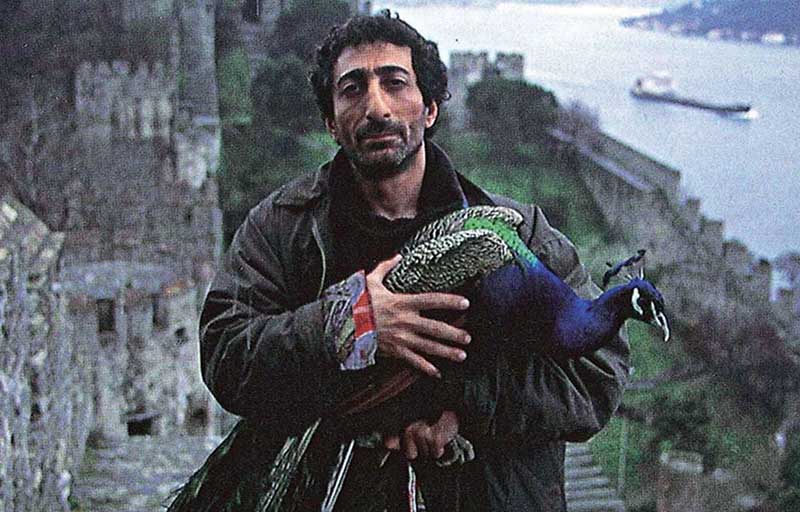
NL Tabutta Rövaşata is het waargebeurde maar allegorische verhaal van een autodief die steelt om zichzelf warm te houden tijdens koude winternachten. Mahsun is dakloos en werkloos. Hij woont in Rumelihisari (een van de meest pittoreske en oudste wijken van Istanbul) en probeert in leven te blijven met de hulp van lokale vissers. Mahsun houdt van auto's, hij steelt ze 's nachts en 's ochtends rijdt hij ze terug, schoon en goed onderhouden. Hij leeft om het vreemde samenzijn van mogelijkheden en onmogelijkheden te benadrukken. Hierin ervaart Mahsun vriendschap, vertrouwen, een eenzijdige liefdesrelatie en marteling. Hij staat erop om te overleven in zijn openluchtdoodskist in de oude straten van Istanbul.
Het geld dat wordt ingezameld met de kaartjes gaat naar mensen die getroffen zijn door de aardbeving in Turkije, Rojava en Syrië.
EN Tabutta Rövaşata is the true but allegorical story of a car thief who steals to keep himself warm during cold winter nights. Mahsun is homeless and unemployed. He lives in Rumelihisari (one of the most picturesque and oldest quarters of Istanbul), and tries to stay alive with the help of local fishermen. Mahsun loves cars, he steals at nights and in the mornings he drives them back clean and well kept. He lives to emphasize the strange togetherness of possibilities and impossibilities.In this togetherness, Mahsun experiences friendship, trust, a one-way love affair and torture. He insists to survive in his open-air coffin of ancient Istanbul streets.
The money collected with the tickets will go to people affected by the earthquake in Turkey, Rojava and Syria.
Zaterdag 23 september, 17:30
SPECIAL
Oldboy (올드보이) + aftertalk with Nilesh Kumar
Park Chan Wook | 2003 | Zuid-Korea | 120’ | EN subs

EN Filmhuis Cavia and film curator Nilesh Kumar invite you to celebrate the 20th anniversary of the South Korean modern classic Oldboy (2003) by Park Chan-wook. A screening of the film followed by a presentation and a Q&A session with you.
In 1995, the US government removed the last restrictions on the internet, allowing it to reign globally for (non-military) commercial use. From then on through the late 1990s and early 2000s this technological advancement saw huge changes in society and culture. The South Korean blockbuster Oldboy contains and relishes in all of these technocultural changes. We firstly look at the techno-cultural changes taking place from 1995 to the early 2000s, and how they were interpreted by certain filmmakers and media at large. Secondly, we will see how these influences are integrated into Oldboy, making it a transnational entity diverging it from a historically common allegory in South Korean cinema. In the final section we look at the protagonist’s flee for innocence from the murky techno-concrete matrix of this new globally connected world.
Nilesh Kumar is from England, of Gujarati-Indian background, and is based in South Korea. He is a film curator and co-founder of the Seoul-based underground-movable cinema, STEAK FILM and the sexuality-themed underground cinema and gallery, STEAK CINEMA. He is currently pursuing an MA in Korean Studies at Yonsei University in Seoul, focusing on (Korean and East Asian) Cinema. This may lead to a PhD soon. His work has been included at Cinema Galeries in Brussels, Soho House Mumbai, Perpetual Spring in MMCA Seoul, and the Canadian Film Centre. His latest exhibition is currently on the 20th Anniversary of Oldboy at Cinema Galeries in Brussels - from 21st September to 17th December 2023.
Vrijdag 29 september, 20:30
SEX-POSITIVE
Kissable Screens: Las hijas del fuego (The Daughters of Fire)
Albertina Carri | 2018 | Argentinië | 115’ | EN subs
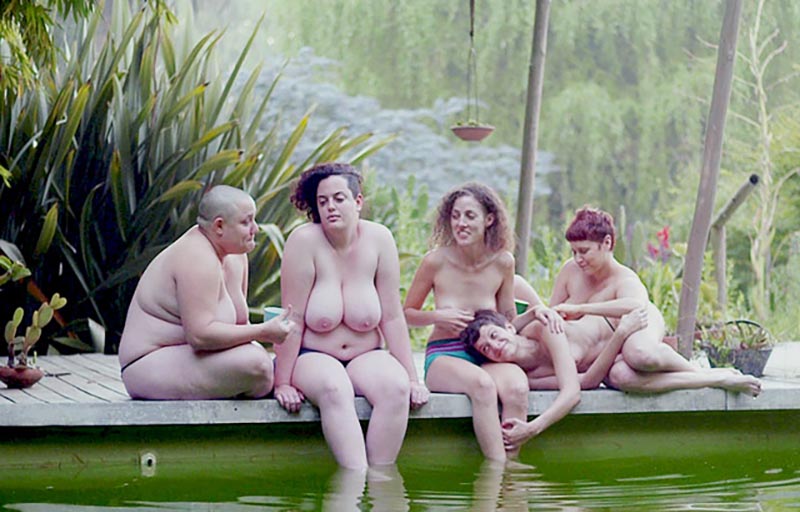
NL Kissable Screens, Cavia's maandelijkse seks-positieve pornoprogramma, is terug met een opwindende en prikkelende film. Drie vrouwen ontmoeten elkaar toevallig aan het einde van de wereld, in Argentijns Patagonië, en beginnen een polyamoreuze reis, verstrikt in de zoektocht naar nieuwe soorten relaties, ver weg van bezetenheid en pijn. Ze worden de Daughters of Fire, een band die zich toelegt op het helpen van vrouwen die op zoek zijn naar hun eigen weg naar erotiek.
EN Kissable Screens, Cavia’s monthly sex-positive pornography programme, is back with a pleasing and thought-provoking film. Three women meet by chance at the end of the world, in Argentinian Patagonia, and set out on a polyamorous journey, caught up in the search for new kinds of relationships, far from possession and pain. They become the Daughters of Fire, a band dedicated to helping those women who look for their own path to erotica.
Zaterdag 30 september, 20:30
FUNDRAISER
Recuperando el paraíso
José Arteaga, Rafael Camacho | 2017 | Mexico | 73’ | EN subs
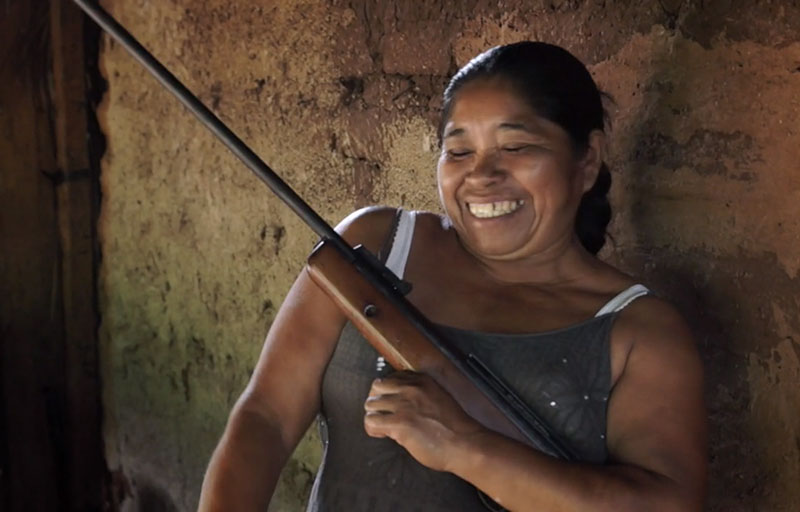
NL In heel Mexico (en daarbuiten) voert een triade, die wordt gevormd door de Staat, bedrijven en (para)militaire groeperingen, een onzichtbare oorlog tegen inheemse volkeren. Megaprojecten, mijnbouw, energiewinning, toerisme en drugshandel zijn slechts enkele vormen van kapitalisme waarmee het land van hun voorouders, meren, bergen, lucht, en hun lichamen en waardigheid met geweld worden onteigend. Maar waar onderdrukking is, is ook verzet. De Inheemse Nationale Raad (CNI) en het Centrum voor Mensenrechten Fray Bartolomé de las Casas (Frayba) reizen door Slumil K’ajxemk’op, ook wel bekend als Het Land Dat Zich Niet Overgeeft, oftewel het Europa van onderaf, om solidariteitsnetwerken op te zetten en hun manier van leven te verdedigen.
De film laat zien hoe de inheemse gemeenschap van Santa María Ostula het geweld en de onteigening van hun land probeert te overleven tegen de achtergrond van de oorlog tegen de drugshandel in Mexico. De opkomst van deze zelfverdedigingsgroepen betekende dat de bewoners die voorheen ontheemd waren, eindelijk konden terugkeren naar hun land en beginnen met de wederopbouw van hun gemeenschap.
Deze vertoning wil een kijk bieden op de vele facetten van de strijd van de inheemse gemeenschappen in Mexico en deze vertalen naar onze eigen strijd hier. Er zal geld worden ingezameld om de reizen van Mexico naar Nederland, en door heel Europa, van de leden van de Indigenous National Council (CNI) en het Centrum voor Mensenrechten Fray Bartolomé de las Casas (Frayba) te kunnen financieren.
EN Throughout the territory we call “Mexico” (and beyond); the triad formed by the State, the corporations and the (para)military groups wage an invisible war against indigenous peoples. Mega-projects, mining, energy extraction, tourism, and drug trafficking are some of the main forms of capitalism driving the violent dispossession of their ancestral lands, waters, mountains, air, bodies and dignities. But because whenever there is oppression there is resistance, the Indigenous National Council (CNI) and the Center of Human Rights Fray Bartolomé de las Casas (Frayba) are traveling through Slumil K’ajxemk’op, the Land That Does Not Surrender, the Europe from below, to weave and strengthen networks of solidarity in defense of life; here and there.
In the film, the indigenous community of Santa María Ostula is trying to survive the violence and dispossession of their lands in the context of the war against drug trafficking in Mexico. With the uprising of the self-defense groups, the residents who had previously being displaced, could finally return to their lands and begin the reconstruction of their community.
This screening aims to offer a look into one of the many mirrors of struggle of the indigenous communities in Mexico, and to reflect it into our own struggles here; as well as to collect money to help funding the travel of members of the Indigenous National Council (CNI) and the Center of Human Rights Fray Bartolomé de las Casas (Frayba), from Mexico to the Netherlands, and throughout Europe.
